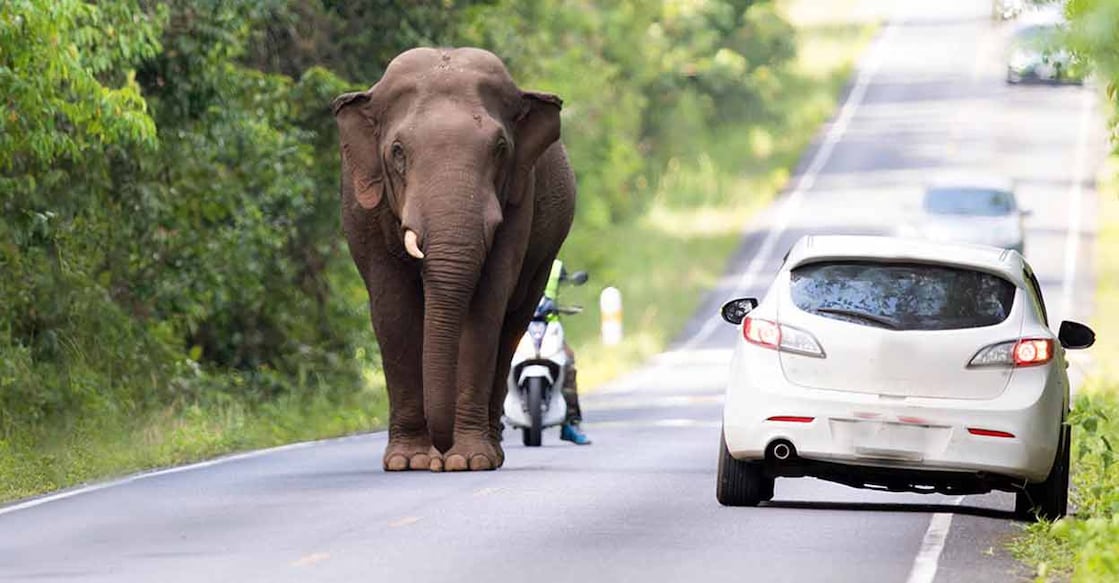Padayappa, Kattakomban, Hose Komban... What should Munnar tourists do if they encounter elephants?

Mail This Article
Apart from being a much-loved hill station for tourists from across the globe, Munnar is home to several herds of elephants. With an increase in animal encroachments into human habitats, visitors and local residents encountering these majestic tuskers have become frequent. Some of the narrow escapades go viral on social media.
There have also been instances of elephants killing unsuspecting travellers, who either panic or end up provoking jumbos to charge at the visitors.
Such human-animal conflicts can be avoided to a certain extent if tourists take precautions when they encounter elephants on the road or during treks. Wildlife enthusiast KR Vancheeswaran offers a few tips to conduct themselves in these scenarios.
Do not honk or turn the engine off
It's important to give animals their space while travelling through forest roads. "Rather than get distracted by loud music or chatter, be alert when you drive through roads where elephants are spotted regularly, especially those through forests," Vancheeswaran says. "Follow the speed limits specified for the roads and pay attention to markers on animal crossings. Most often, stopping the vehicle at a safe distance of 100 metres or more is enough to let the animal cross. If there is enough space and not too much traffic, you can also consider turning around and leaving the spot in the opposite direction. Do not honk, as it can irritate the animal. Do not switch the engine off either."

Do not get out of the vehicle
Referring to various man-animal conflict videos that went viral, he says people should refrain from getting out of vehicles on forest roads. "You are not supposed to go out of the vehicle in forest areas. Do not try to take selfies or videos, or resort to thoughtless acts of bravado. Just let the animal cross," says Vancheeswaran.
What about the vehicle lights?
Whether it is during the day or night, it is better to keep the headlights on and the dome lights off. If the elephant is very close to the vehicle, headlights can act as a deterrent, Vancheeswaran explains.
What to do in unprovoked attacks?
Elephants can turn aggressive if they have calves with them. Give them as much space as possible. If you are on a two-wheeler and there isn't enough space, leave the vehicle and leave the area as fast as you can. Do not let the animal smell you as it can perceive you as a threat. Do not hoot to irritate elephants who are in attack mode as that will panic them further.
Vancheeswaran explains that often, animals turn aggressive due to previous bad experiences. "On the Karnataka side, elephants are usually docile. However, Kerala jumbos are generally aggressive as they haven't seen the humane side of humans much," he says.

Forest Department's poster
In March, the forest department released a poster titled 'Elephant Behaviour at a Glance' to help people understand how to handle an animal encounter. The poster, which was published on the department’s social media handles, illustrated the most common characteristics of the elephants.
According to the poster, an elephant will be aggressive while in musth, so it is unsafe to approach or provoke it. “While travelling in a vehicle, do not honk or switch off the engine. Maintain a safe distance,” the poster said. The public is also urged to move to safe locations when there is information on wildlife entering settlements. Besides following instructions provided by the authorities, the public is also advised to not obstruct the activities of the experts.
Elephant body language:
1) If an elephant is flapping its ears gently, it indicates the animal is calm
2) If the trunk is raised, it shows the elephant is observing the surroundings
3) If the elephant stands still with ears extended, it has sensed that something is wrong
4) If the tail is erect (upward or downward), the animal is tensed
5) If the trunk is curled up and the elephant is charging, it is angry


